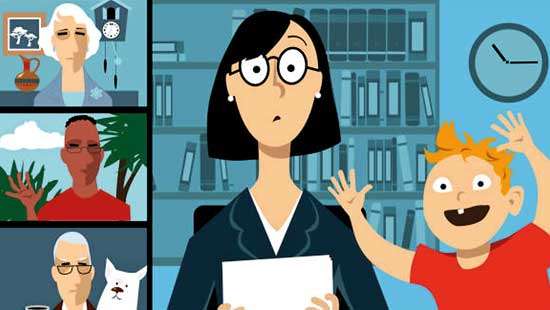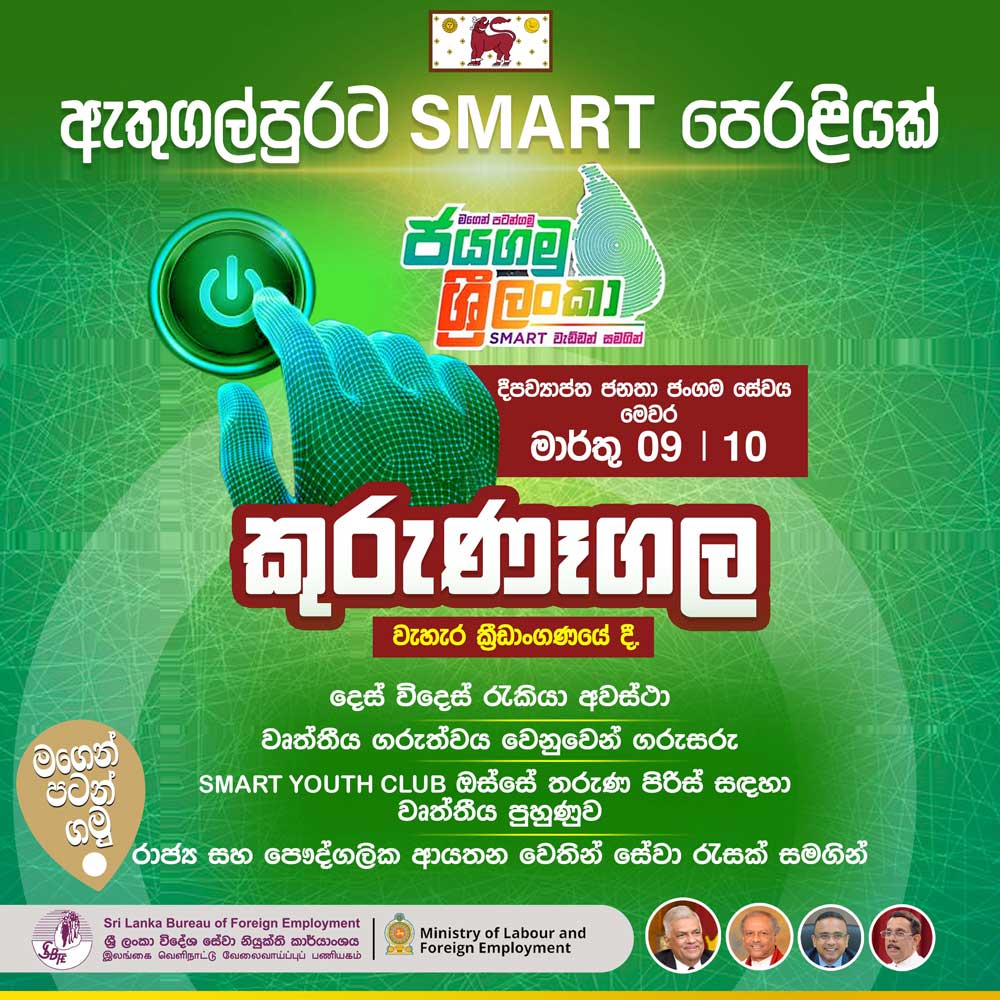This school year has been unlike any other. As Covid-19 threatens to widen the education divide across the world, Sri Lankan teachers and students are still struggling to adapt to the new on-line classrooms. One teacher describes what it takes to do it all and what we’re doing wrong.
Being a teacher of more than 20 years, in state, private, semi government and also international schools, I believe time is ripe to voice out certain opinions that might be valid in the current situation. It is always natural for any authority to grasp education as it mitigates or overpowers the system of authority in the long term. Therefore in Sri Lankan education from Kannangara to modern day pundits became the hot bed of haphazard vehicle of change. (Of course Dr. Kannangara, “Father of Free Education’ must have envisaged a different reality in comparison to modern era despots of education)
“Teachers who were physically trained to handle children were forced to do it on-line”
I would like to highlight the mishandling of education in the dawn of Covid 19, which hastily brought forth the technological era. It is a pity, that knowing evolution took millions of years to adapt to changes, the education authorities in the world seek instant resolutions, neglecting the long term repercussions it might inflict on tender minds of future generation. As usual it is one of the characteristics of the majority of humans only to look at the cause and effect phenomena, or having the tunnel vision which brought forth many consequences hard to handle.
The teacher, the guide, the facilitator and the contributor in imparting knowledge, it is pathetic to see how little one pays attention to this key contributor. In the chase to start schools, the private sector went forth with on-line education, calling it as ‘on-line school’, neglecting the skills needed of the teachers in handling devices. Isolated in a jungle of technological mess, and at a time when jobs are scarce, many teachers trudged along with a basic training which was also instantly given, reminding one of ‘koththu’ boutiques.
Years of criteria that governed the mode of physical delivery of education is changed overnight. The rapport, eye contact, voice modulation, flexibility, coordination, humour, individual attention have to be focused to a screen which many teachers struggle to control in the midst of chuckles from their own students who were well versed in handling the rapport, eye contact, voice modulation, flexibility, coordination, humour, individual attention has to be focused to a screen which many teachers struggle to control technological implements. The discipline of the classroom and the well versed holistic education which should be imparted, now has to be converted to the on-line mode making it one of the mysteries that one has to handle.
“Authorities went ahead with the clichéd form ‘new normal ‘which produced an aversive classical reaction in the teachers who heard it”
Most of the teachers suffered from these changes but the authorities went ahead with the clichéd form ‘new normal ‘which produced an aversive classical reaction in the teachers who heard it. Some of the pioneers who introduced on-line have never taught in a school, never gone through the experience of a teacher, never understood even the basic principles of education and never seen the children from a teacher’s viewpoint . Thus teachers who were physically trained to handle children were forced to do it on-line. The most important part of a country’s system became another materialistic framework.
A teacher usually works for six hours, and the total time, uses the powers of the mind. Our brain which is a three-pound matter, needs 20% of energy which is vast for its size. Therefore, after six hours, the teacher as well as the student needed respite. But it is not to be, it is declared at any time of the day from 2 -8 p.m. a teacher should be available for a Microsoft training programme as it is imperative for teacher to create an enthusiastic classroom. The students were given study packs and assignments in order to be gazing at the computer for extended periods after the aforementioned six hours. It is sometimes noteworthy how some minds work as they also might be products of the traditional education. Now everyone has come to add to the soup of education.
The lines blur between home and work place which also created confusion and depersonalisation. As work mingled with the home, many priorities were imposed neglecting the personal climate of the individual. This may be a long term social issue which should be handled by sociologists. The ethical interims of work routine and the boundary between personal time and professional work also should be drawn if we are to find a respite.
“The rapport, eye contact, voice modulation, flexibility, coordination, humour, individual attention has to be focused to a screen which many teachers struggle to control”
It is easier to argue that teaching is a vocation and the teacher should be there at all times but have we ever considered the teachers’ mental health? I believe that like the traffic police officers who were constantly criticized and who were the first in line of blame for traffic congestions, the teacher comes closely as the first factor of blame when anything remotely closer to education has been ridiculed. I have witnessed absenteeism, disorientation, burn out not to mention physical discomforts of being seated in the same position with a stiff neck and a back during these spasms of on-line education. To top it all the administration including the tech specialists (now in a driving seat), principals with no experience in the area, much less education and other mushroom theorists sprang up and took hold of the system becoming the pioneers of Covid-19 education ‘Game Changes’. Thus teachers’ health is swept under the carpet, reflecting the backward attitudes of years before.
Students, the recipients of on-line jargon also suffered immensely. Parents believing that on-line, as the only mode of education system, exposed the kids to screen time of 5/6 hours regardless of the symptoms both students and teachers showed after on-line activities such as eye weaknesses, double vision, blurriness, headaches etc. I do not know if a long term
research is available in this respect.
Many students find the on-line platform an interesting outlet to play games, so while the teacher engages in the lesson the student may be in a virtual reality. ICD 10 the diagnostic tool published by WHO stated on-line gaming as a disorder which falls under addiction, not to mention the fact that the recent Sri Lankan population was considered to be the first in the world in visiting pornography sites. It is important that parents consider this in a balanced manner before they grant their children access to the on-line world.
I believe many parents in rural areas are unable to supply the simple desktop computer or a laptop for their children, so by giving education to only the haves, are we again perpetrating the disparity between haves and have-nots and widening the gap in the social fabric?
So, we happily exposed teenagers as young as 13 and small children as young as three years to on-line drama. Susan Greenfield, a pioneer in the field of neurology states in her book ‘Mind Change’ that, ‘research on the effect of digital technology on our minds is still in its early stages, and that screen activities such as social networking sites, gaming and surfing the net have been shown to have positive as well as negative effects.’ She also acknowledges that, “The mid-21st century mind might almost be infantilised, characterised by short attention spans, sensationalism, inability to empathise and a shaky sense of identity. I also like to state that Steven Sloman and Philip Fernbach in their book,‘Knowledge illusion’ state that, ‘people like Elon Musk, Stephen Hawkings and Bill Gates have cautioned that technology has become so sophisticated that it decides to pursue its own goals of the humans who created it.’
Rene Descartes in 17th century spoke of Cartesian logic where he placed mind and body in two different spheres, which was disproved decades ago, but it is sad to see still that in the 21st century Sri Lanka we believe in this. Treating the body and neglecting the mind or rather neglecting the psychological impact might haunt us in different ways which we may be unable to overcome.
I believe that on-line is one of the solutions that might have introduced to us in this time of unpredictability when schools were closed. Even though it is a an alternative, is it suitable to impose it in such a haste? Is it also right to undermine the voices of teachers and children? Is it right to show it as the only viable option so the fee- levying schools can function marginalising the students of the government sector and indirectly lure them into it? Isn’t it time that we look at such an essential commodity as education. in a balanced perspective. In the midst of all arguments it is praiseworthy that President Gotabaya Rajapaksa has identified the menace, as he stated in a much televised statement, that closing schools is not a viable option and that closure of schools might have a long term impact.
Therefore, it is the sole responsibility of Sri Lanka’s pioneers in education, to look at the stalemate education system and make rapid changes that will benefit both teachers and students and also to bring forth a long term plan of education with systematic rules and regulations pertaining to ethics, that will restrain the so called tech specialized, all-knowing -pundits from taking the education system into their grasp. Then and only then, can we see, education bringing enlightenment, where we can see clarity through darkness.












